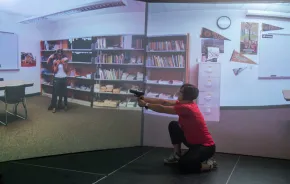
About a month ago, I looked at my kids and lost it. It was an otherwise normal afternoon. My 10-year-old had been playing a computer game. My 8-year-old was on the iPad with Minecraft. Homework had been done, and — as was happening more and more lately — I had let our long-standing rule of no screens on weekdays slide. They did their homework, I thought to myself, hungry for some more of my own uninterrupted work time. They're such good kids.
But then it was time to stop the screens and move toward dinner. My husband and I asked our older daughter to get off the computer and load the dishwasher, one of her usual chores. We directed our younger girl to shut down her world-building and pick up the piles of books she has a habit of leaving everywhere.
It seemed, in that instant, like all hell broke loose. One daughter couldn't detach from the screen in front of her, and when she finally did she began slamming around in a huff, a scowl on her face. Once in the kitchen, both kids started immediately bickering with each other, completely unable to work together on simple chore tasks, make small talk or be kind. When we tried to engage with them for family time and to talk about our days, our kids seemed unable to break their sudden spell of disgruntled sourness.
I realized suddenly with a smack of clarity that it had been like this since the Christmas holidays a month earlier, when, over the break, we let our kids have as much screen time as they wanted in between family outings and activities. It's the school holiday, we had figured, let's let them relax. But now, I saw, things had slid out of hand. The kids seemd more grouchy and were fighting more with each other. Their sleep had become disrupted, and our younger daughter was waking up in the middle of every night, unable to get back to sleep in her bed. I felt I was to blame, and also felt irrationally pissed off at my kids.
"That's it!" I said loudly, feeling my own sense of control quickly spinning away from me. "You guys are off screens until further notice. For a month at least. No iPad, no TV, no Xbox, no laptop, no iPod, no phones. Done! We are going to get this under control!"
My husband jumped on board, dramatically pulling plugs from the wall in the living room right then and there, gathering devices and putting them in a basket on a high shelf. Our kids looked panicked but also surprised.
Later, when I had calmed down, we made a plan and explained to the kids why we were putting them on a screen fast — so they could be reminded that there was a real life away from screens, and that they needed to focus on effective and productive ways of communicating and dealing with humans face-to-face. And we also agreed to cut down our own use of screens outside of work time.
This was perfect timing for me to watch a screening of a new local documentary, Screenagers: Growing Up In the Digital Age (trailer below). Physician and director Delaney Ruston decided to make the film when she found herself constantly struggling with her own two kids about screen time. Ruston felt guilty and confused as her younger teen daughter's appetite for a smartphone grew and her older son spent hours playing video games. She wasn't sure what limits were best, and so she sought out experts to weave in insight about the academic impacts of screen time, social-emotional learning, online bullying, family relationships, teens' social pressures, and addiction.
Yes, that's right, addiction. Watching Screenagers, which includes the story of a boy who must be sent to a screen rehab center in Washington state, forced me to confront this issue, which it turns out is a real concern. Kids and adults are addicted, showing signs and withdrawal symptoms similar to those exhibited by people with alcohol, drug and gambling addictions.
The film, produced by Scilla Andreen, interviews thought leaders such as Peggy Orenstein, Sherry Turkle, Laura Kastner, Simon Sinek, as well as leading brain scientists who present evidence on the real changes happening in the brain during and after screen use.
Besides confirming for me that screen time can have a measurable impact on academics, relationships and even mental health, it also offered undeniable evidence that violent video games are not "just games" but are diluting kids' ability to empathize. This is something that many parents of boys I know (because, often it is boys who are playing the most violent games) do not want to hear or face. But we need to face it, and watching Screenagers will give you fuel to withstand the complaining, opposition and even manipulation that is likely to ensue when you set new screen limits for your kids.
One of the arguments against parents developing and holding kids to rules around screens is of the "they're digital natives, we have to be realistic, screens are just part of their lives" variety. Yes, obviously our kids' lives are enmeshed, even to a large extent driven by screens. And that's the point — we want them to become responsible users of the digital realm. This is the realm in which they will learn, live and, later, support themselves. We also want to raise happy, empathetic humans who have been given the opportunity to develop a strong sense of self, and self-control.
So what happened after I instituted an emergency screen fast in my house? After a couple of weeks, my kids had gone back to toys, activities and books they had not looked at or touched in quite some time, encouraged to do this because of boredom. I caught them crouched on the floor, playing imagination games. They engaged in real life world-building, with a set of old wooden unit blocks. They still bickered, but not as frequently. A new effort to log weekly chores, and disburse allowance directly into their bank accounts, took off — through their prompting, not ours.
No, this window hasn't been perfect. And I believe in sane screen time, so we've reintroduced Saturday's family movie night, spent a few nights showing the kids classic music videos (thank you, David Bowie, for the reminder), and had a fun time watching the Grammys together with friends. They will use screens to research their science projects, and they can earn computer time to write stories or play educational or world-building games on weekends.
But the screen diet worked for us, and watching Screenagers armed me with data, science and strategies to approach the digital realm more carefully moving forward.











